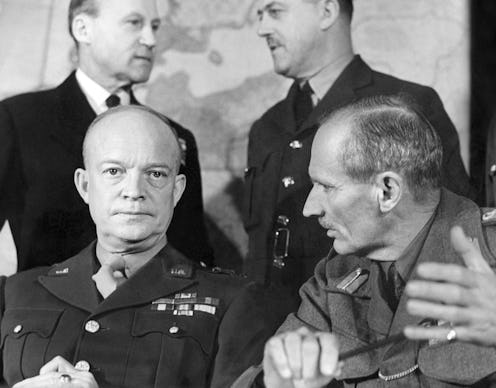First, it was Dwight Eisenhower. Now, the second man to occupy the Oval Office without having ever served in elected office might just be Donald Trump. As a political outsider, there's no doubt that he's defied the odds — whether or not that's a fortunate thing is an entirely different question. With approximately 1,050 delegates, the billionaire businessman is on track to win the 1,237 delegates needed to snag the Republican nomination and avoid a contested convention. Not to mention, he's the only standing GOP candidate after Ted Cruz and John Kasich dropped out of the race promptly following Indiana's primary.
Now, Trump's real opponent is Hillary Clinton, who will win the nomination as long as her superdelegates don't flip flop at the Democratic National Convention. Whether or not Trump can defeat the former secretary of state, who has served in multiple offices, is the bigger question. According to RealClearPolitics' aggregator, polls predict Clinton would come out on top by just 6.5 points. But, as we witnessed in the Michigan Democratic primary, predictive polls aren't always reliable and, when it comes to politics, dynamics can change in the blink of an eye.
Flipping through the pages of history, it's clear to see that candidates like Clinton, who have served in office, have a greater chance of moving up in the ranks. Similarly, incumbents have historically had an advantage over newcomers. For Americans, a candidate's political experience has been perceived as comforting. Now, as more and more citizens become fed up with the political establishment and the special interests that influence it, that's beginning to change.
In 2016, Trump's status as an outsider who can't be bought — because as he's made sure to tell us, he's a billionaire — has proven to be a mobilizing force. Bernie Sanders' revolution has come this far for similar reasons. Sanders might be a senator of Vermont, but he's never identified with a particular party and has consistently spoken out against corporate giants' grip on government policy.
Trump and Eisenhower, however, differ immensely. Eisenhower, for example, had an impressive military record that demonstrated his knack for strategizing and diplomacy. For decades, he climbed up the military ladder and represented the United States during invasions in North Africa and Germany. Unlike Trump, the two-term Republican president had a less bellicose attitude, despite having witnessed the horrors of war. In fact, upon being named the first Supreme Allied Commander of NATO in 1950, Ike participated greatly in the peace process. His slogan for reelection in 1956 was "Peace and Prosperity." And in many ways, he fulfilled it by negotiating an armistice on South Korea's border and cooling down Cold War mentality.
Based on Trump's pointed ideological attacks on Mexican immigrants and Muslims, it looks as though the same can't be said this time around. In reality, the two political outsiders might not actually have that much in common.
